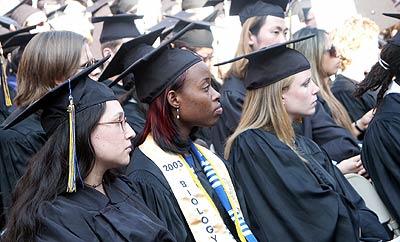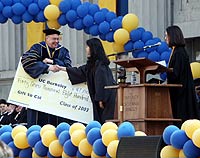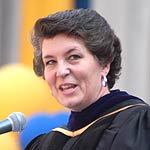 |
The sun shone brightly on the tasseled heads of the Class of 2003 assembled at the Greek Theatre for Commencement Convocation. (Bonnie Powell photo) |
Facing a changed world, graduates should commit to public service, convocation speakers urge
 Flash
slideshow: Commencement
Convocation 2003 Flash
slideshow: Commencement
Convocation 2003 |
BERKELEY - Although convocation keynote speaker Leon E. Panetta was the only one to quote John F. Kennedy directly, the spirit of "ask not what your country can do for you - ask what you can do for your country" echoed throughout Thursday's Commencement Convocation. As the Class of 2003 basked and squinted in the afternoon sun, speaker after speaker exhorted them to give back to their university, their communities, and the world through public service.
|
That message was leavened with plenty of jokes, of course, starting with the remarks of Mark Ornellas, president of the California Alumni Association. Ornellas recalled the days of his own graduation from Cal in 1971, when students were told not to trust anyone over 30 and thought those over 50 had little knowledge to offer. Now that he himself is over 50, Ornellas said, he realizes how much still remains unknown to him, such as "why gas prices rise so fast but fall so quickly," "did Lee Harvey Oswald act alone?" and "why is it necessary to refrigerate sour cream?"
Turning serious, he told the assembled students that although he hadn't read Hillary Clinton's book "It Takes a Village" - "I'm waiting for the Cliffs Notes," he cracked - he believed the premise applied to them. "None of you made it here alone," he said, "and you cannot possibly ever repay this debt adequately." Ornellas urged the graduates to repay those who had helped them by assisting those who will follow in their footsteps.
 Allison Gontag, chair of the Class of 2003 Gift Committee, presented Chancellor Berdahl with the biggest check ever from a graduating class. (Bonnie Powell photo) |
The Class of 2003 has made good progress on that goal already. Following Ornell's speech, Allison Gontang, chair of the class's Gift Committee, presented Chancellor Robert M. Berdahl with an oversized check for $47,800 to endow a perpetual scholarship fund for future students. This year's gift was the largest ever, despite the bleak economy. (The first UC Berkeley senior class gift, Gontag noted, was made in 1874, when $48.10 was raised to purchase library books.)
After thanking her, Berdahl offered the gowned and betasseled students his "conditional congratulations" - many still have exams to finish before they formally graduate - and warned that they would remember very little of what happened at convocation. "I've been to lots of commencements, and I don't remember any of the speeches," Berdahl said. "And I've given some of them."
Protecting the First Amendment
The 50th-year Reunion Distinguished Speaker, Ronald J. Ostrow, attended UC Berkeley for his undergraduate and graduate work before becoming a reporter for the San Francisco Chronicle, the Wall Street Journal and, from 1962 to 1998, the Los Angeles Times. In his address, he recalled the Berkeley of his student days, when faculty were required to sign a "Loyalty Oath" renouncing ties to or sympathy with the Communist Party. He compared the activities of Joseph McCarthy's House Un-American Activities Committee to the present-day branding of citizens as unpatriotic for questioning the wisdom of the war with Iraq.
"It is dishonorable to withdraw an invitation to speak at the Baseball Hall of Fame from [peace activists and movie stars] Susan Sarandon and Tim Robbins because of their views," Ostrow proclaimed. "What has happened to the First Amendment?" To wide applause, he commanded the Class of 2003 to never fear to speak up for their beliefs - whatever they might be.
"Citizens of the world"
The next speaker, UC Berkeley adjunct economics professor Martha Olney, a recipient of a 2003 Distinguished Teaching Award, began her address more lightheartedly. Olney painted a humorous yet dire picture of how the world had changed since the Class of 2003 entered school four years ago. "When you started college, people were seriously entertaining dreams of retiring at 35," she smiled. "Now you just hope that by the time you're 35, you can afford to move out of your parents' house!" She mixed such comparisons with more serious ones, such as " When you started college, America had allies around the world. Now it sometimes seems America has enemies around the world and virtually unchecked superpower military might."
 'When you started college, there were signing bonuses for taking jobs and hundreds of applicants for each apartment. Now there are signing bonuses for taking an apartment, and hundreds of applicants for each job.' —Martha Olney, Adjunct Professor of Economics
(Peg Skorpinski photo) |
The key for students — in addition to fortifying themselves with lots of shouts of "Go Bears!"— is to remember what they learned at Berkeley. "At Cal, you've learned how to be a citizen in our world," Olney repeated, advising that the critical thinking instilled in Cal students should spur them to question all assumptions: whether what's right for the U.S. is right for the world, whether tax cuts that benefit the rich are right for society, and if the forgiveness of Third World debt will improve those countries' economic performance. "The world you are stepping into is not in good shape," Olney warned, urging students to try to make a difference in whatever way they can. (Read the full text of Olney's remarks.)
"Be the change you want to see"
University Medalist and Rhodes Scholar Ankur Luthra continued the theme. He invoked his hero Mahatma Gandhi to urge his fellow students to follow the saying by which Luthra lives: "Be the change you want to see in the world." Referring to Berdahl's joke about forgettable commencement speeches, Luthra told the Class of 2003 that he hoped they would at least remember his remarks, so they would continue to ask themselves what change they wanted to be.
Like Olney, he emphasized that the starting point is any kind of public service, no matter how small or how ambitious. "I ask, What bothers you? ... If nothing bothers you, I am deeply saddened," Luthra said. "Complacency and selfishness are the core ingredients to a fading soul."
The road to making a difference can be difficult and filled with accusations of idealism and even stupidity, Luthra cautioned. "I can almost guarantee people will call you crazy. The self-satisfied tend to think impact-makers are crazy," he said. "I would take it as a compliment, actually. After all, those who were crazy enough to think they could change the world were the ones who did. And I'm next. And you're next. We, the Cal Class of 2003, are next." (Read the full text of Luthra's remarks.)
The priest and the rabbi
Keynote speaker Panetta, who served as chief of staff in President Bill Clinton's White House, began by explaining his background. A Monterey, Calif., native and the son of Italian immigrants, Panetta was the first in his family to go to college. Panetta recalled a question he had asked his father many times: Why did he travel 3,000 miles to a strange country, with no money in his pocket and few possessions? The answer, said Panetta, was the essence of the true American dream: "To give his children a better life."
 'It is the disconnect between your interests and concerns about society and your willingness to engage that will determine the success of your beliefs.' —Leon Panetta, Director of the Panetta Institute
(Peg Skorpinski photo) |
Like Olney, Panetta warned the Class of 2003 that they were stepping out into a difficult, troubling world, one filled with paradoxes. Although the U.S. has the most powerful military in the world, he said, "power alone will not resolve all these issues," dilemmas such as achieving stability in Afghanistan and Iraq, bringing a permanent peace to Palestine and Israel, and resolving the nuclear threat of North Korea. The only solution, Panetta said, is for the United States to "act like a world leader, not an empire." More paradoxes face the graduating students in the economy - one of the strongest in the world, yet one facing record trillion-dollar deficits - and in tax cuts for the rich that will increase the "taxes on our children, who will have to pay that debt."
But the biggest paradox of all, Panetta argued, was the state of democracy in the United States. While "our democracy is a beacon to the world in terms of what freedom and self-government are all about," less than 50 percent of eligible voters voted in the last election. According to polls conducted by Panetta's nonprofit institute, the age group most guilty of political apathy was the very one sitting in the audience - although Panetta did allow that Berkeley students typically are more politically motivated and active than the rest of their college peers.
Invoking the late President Kennedy's famous speech, which accompanied creation of the Peace Corps, Panetta said that today's world demands a similar level of commitment. He argued that all young people should be required to fulfill a two-year public service requirement, whether it be in the military, environmental conservation or social work. In return, he said, the government should provide the equivalent of a G.I. Bill to fund young people's education.
Panetta urged the Class of 2003 not only to get involved in public service, but to get involved politically. "It is the disconnect between your interests and concerns about society and your willingness to engage that will determine the success of your beliefs," he said. Panetta illustrated his point with a humorous parable about a priest and a rabbi who were attending a boxing match of their favorite champions. Before the match, the priest crossed himself, and the rabbi said he had always been curious as to what the gesture meant. "Not a damn thing, if he can't fight!" responded the priest.
"You can bless yourself with the hope that everything will turn out OK," summarized Panetta," but you're still going to have to fight for what you believe in."


